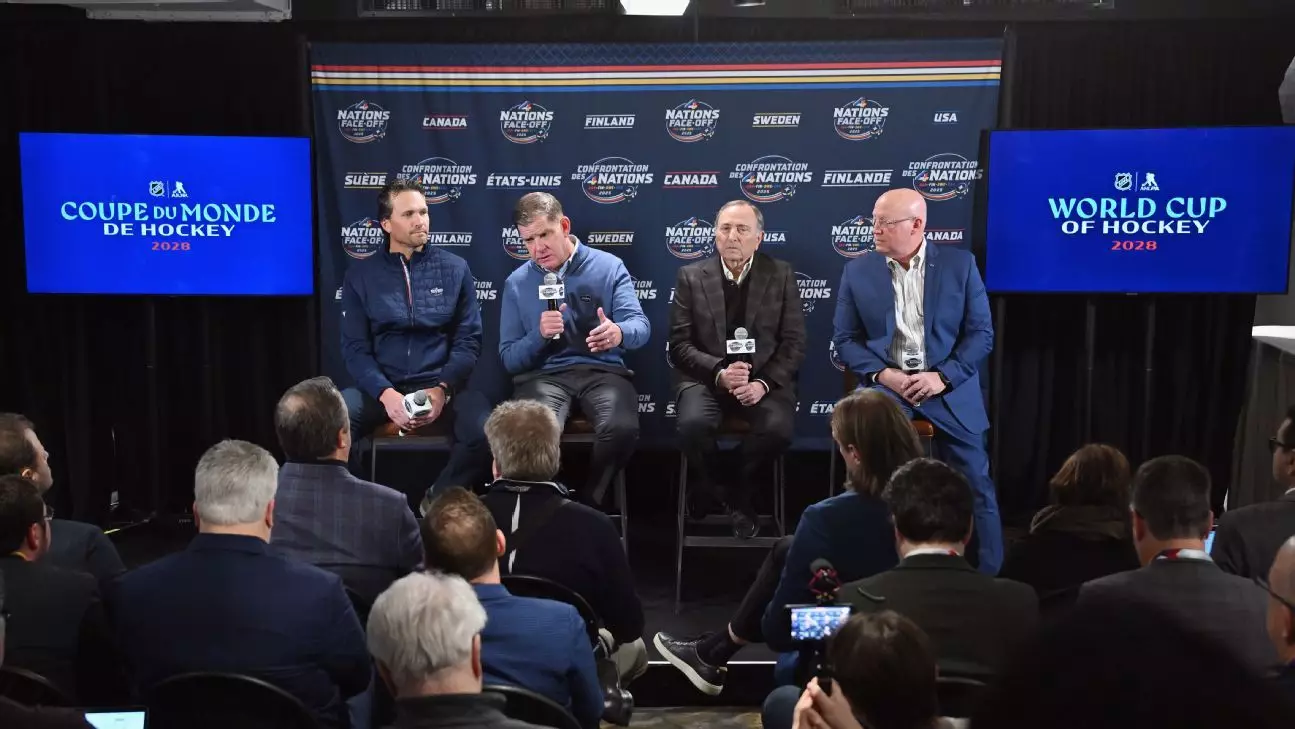The excitement around international hockey is palpable as the announcement of the World Cup of Hockey’s return in February 2028 has been made. NHL Commissioner Gary Bettman, alongside NHL Players’ Association Executive Director Marty Walsh, unveiled this long-anticipated news during a recent press conference. This revival signals a turning point not only for the tournament but also for the international hockey landscape, fostering a renewed enthusiasm for best-on-best competition.
It has been nearly a decade since NHL players last showcased their skills on the Olympic stage, with the last World Cup of Hockey being in 2016. This enforced hiatus has been detrimental to the spirit of international competition in hockey. Star players like Connor McDavid and Auston Matthews have openly expressed their desire to compete for their home countries in significant tournaments during their peak playing years. Bettman’s optimistic outlook reflects a shared sentiment among fans and players who crave regular appearances of elite hockey in global tournaments.
The commitment to sending NHL players to the 2026 Winter Olympics in Milan signifies the start of a streamlined international calendar, allowing hockey enthusiasts to anticipate high-stakes matchups every two years. Bettman aptly described the upcoming 4 Nations Face-Off as a “sampler,” showcasing an early taste of what fans can expect in future tournaments. This ongoing engagement paves the way for a rejuvenated interest in international competitions.
One of the most significant changes announced is the tournament’s structure, which will return to featuring national teams without the previously experimented concept of “melded teams” such as Team Europe or the under-23 Team North America. By restoring a traditional format where players represent their home nations, the tournament can maintain the essence of national pride that is synonymous with international sports. The lack of IIHF involvement suggests a more direct control by the NHL, focusing solely on NHL players, thus fostering a unique league-centric event.
However, unanswered questions loom over the participation of Russian players in these international events, particularly in the wake of political tensions and the ongoing implications of the situation in Ukraine. The ban imposed on Russia by the IIHF has cast a shadow over their involvement in such crucial tournaments, leaving talented players like Alex Ovechkin and Nikita Kucherov sidelined. Walsh’s comments expressing hope for Russian players to return highlight the challenging landscape of politics overshadowing sports. The NHL must tread carefully as they navigate these geopolitical waters, ensuring the integrity of the competition while addressing the wishes of players and fans alike.
The announcement of the World Cup of Hockey is more than just a return to international play; it signifies an improvement in the relationship between the NHL and the NHLPA. With upcoming collective bargaining negotiations slated to commence, both Bettman and Walsh appear optimistic about the potential for collaboration. The confidence expressed by both leaders suggests that they are aligned in their vision for the future of NHL hockey, particularly regarding international play.
The current collective bargaining agreement (CBA) is set to expire in September 2026. Still, Bettman’s optimism about a smooth negotiation process is a positive sign for both players and fans. A mutually beneficial agreement could further solidify a foundation for running future international competitions more effectively, allowing for the potential for greater participation and a more robust hockey presence globally.
While the details surrounding the tournament’s format and hosting cities, which will invite European bids, are yet to be finalized, the buzz created around the World Cup of Hockey’s return signifies that a new era is on the horizon for international hockey. Bettman’s assertion of the event being “sensational” creates a thrilling prospect for fans eagerly awaiting to witness the best players in the world on the global stage.
The commitment to regular international competition symbolizes a substantial step forward for the sport, affording both fans and players opportunities to engage in and celebrate hockey at its highest level. As the hockey community rallies around this news, the growth of international competitions could redefine the dynamics of the sport, creating memorable moments and fostering rivalries that transcend borders.
The revival of the World Cup of Hockey is a promising development for the sport, emphasizing the need for international competition and player representation. While there are hurdles to overcome, particularly concerning geopolitical factors influencing participation, the enthusiasm for the return of best-on-best competition brings hope for a thrilling future of international hockey.


Leave a Reply